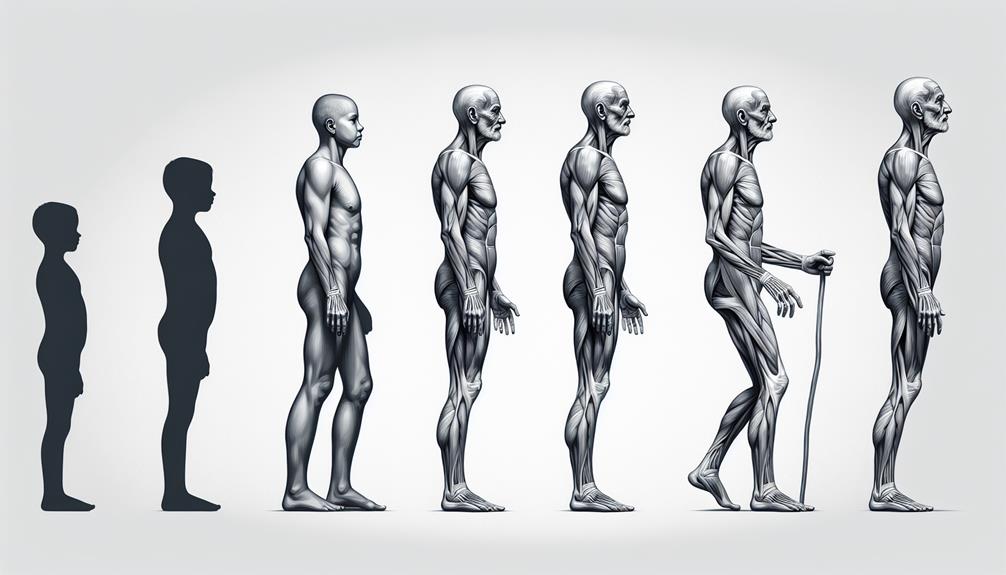
Supplements in senior wellness play a crucial role to maintain optimal health as you age, senior-specific nutrients are essential. Seniors commonly lack iron and vitamin D, impacting overall well-being. Antioxidants combat aging effects, supporting heart and skin health. Supplements are essential in bone health by aiding calcium absorption and density. Cognitive function can benefit from Omega-3, Vitamin E, and Ginkgo Biloba. Enhance immune function with Vitamin C, Zinc, and probiotics. Consult a healthcare provider before starting any new supplement regimen. Ensure you provide your body with necessary nutrients for senior wellness. More insights await on senior health and supplementation.
Key Takeaways
- Supplements support bone health and cognitive function in seniors.
- Antioxidants combat oxidative stress and promote heart health.
- Nutrient deficiencies impact immunity and overall well-being.
- Vitamin C, Zinc, and Probiotics enhance immune function.
- Consult healthcare provider before starting new supplement regimen.
Importance of Senior-Specific Nutrients
For optimal health and wellness in your senior years, understanding the importance of senior-specific nutrients is crucial. As you age, your body's ability to absorb nutrients may decrease, making it essential to focus on nutrients that are particularly beneficial for seniors. Nutrient absorption can be affected by various factors, including changes in digestive function and the use of certain medications.
Senior-specific nutrients play a vital role in supporting overall health and addressing common age-related concerns. These nutrients are formulated to meet the specific needs of older adults, taking into account potential dietary restrictions and absorption issues. For instance, vitamin B12 is important for maintaining nerve function and producing DNA, but absorption of this vitamin can decline with age. Therefore, seniors may benefit from supplements or fortified foods to ensure an adequate intake.
Common Nutrient Deficiencies in Seniors
Common nutrient deficiencies commonly observed in seniors can have significant impacts on their overall health and well-being. Two prevalent deficiencies in this population are iron deficiency and vitamin D insufficiency. Iron is essential for the production of red blood cells, and its deficiency can lead to fatigue, weakness, and impaired immune function. On the other hand, vitamin D plays a crucial role in bone health, muscle function, and immune regulation, making its insufficiency problematic for seniors, who are already at risk of osteoporosis and frailty.
To provide a clearer overview, below is a table highlighting the key aspects of these common nutrient deficiencies in seniors:
| Nutrient Deficiency | Effects on Health |
|---|---|
| Iron deficiency | Fatigue, weakness, impaired immune function |
| Vitamin D insufficiency | Poor bone health, muscle weakness, compromised immunity |
Being aware of these common deficiencies can help seniors and caregivers take proactive steps to address and prevent them through dietary changes and, when necessary, supplementation.

Benefits of Antioxidants for Aging
Addressing common nutrient deficiencies in seniors can be crucial for maintaining optimal health and well-being as they age; exploring the benefits of antioxidants for aging offers another avenue to support overall wellness.
Antioxidants play a significant role in combating oxidative stress, which is known to contribute to the aging process. By neutralizing free radicals that cause oxidative damage, antioxidants help protect cells from premature aging and maintain skin health.
In addition to their effects on oxidative stress, antioxidants also have anti-inflammatory properties that can benefit heart health in seniors. Chronic inflammation is a major contributor to cardiovascular issues, and antioxidants help reduce inflammation, thus potentially lowering the risk of heart-related conditions.
Including a variety of antioxidant-rich foods like berries, nuts, seeds, and colorful fruits and vegetables in your diet can provide an array of health benefits as you age. Consider discussing with your healthcare provider about incorporating antioxidant supplements if needed to support your overall wellness.
Role of Supplements in Senior Wellness for Bone Health
To support your bone health as you age, consider incorporating supplements known to promote strong and healthy bones. Two key factors in bone health are calcium absorption and Vitamin D synergy. Calcium is crucial for bone strength, but its absorption can be influenced by various factors, including age and diet. Supplementing with calcium can help ensure you meet your daily requirements, especially if your diet lacks sufficient calcium-rich foods. However, for calcium to be effectively utilized by your body, adequate levels of Vitamin D are essential.
Vitamin D plays a vital role in helping your body absorb calcium and maintain bone density. Therefore, it's important to consider a Vitamin D supplement, particularly if you have limited sun exposure or don't consume enough Vitamin D through your diet. By ensuring you have optimal levels of both calcium and Vitamin D, you can support your bone health and reduce the risk of conditions like osteoporosis. Remember to consult with your healthcare provider before starting any new supplements to ensure they're suitable for your individual needs.

Supporting Cognitive Function With Supplements
To further enhance your overall senior wellness, exploring the potential benefits of certain supplements in supporting cognitive function can be valuable. When it comes to brain health and memory support in seniors, specific supplements have shown promising results. Below is a table outlining some key supplements that may aid in cognitive function:
| Supplement | Benefits |
|---|---|
| Omega-3 fatty acids | Supports brain health and cognitive function |
| Vitamin E | May help protect against cognitive decline |
| Ginkgo Biloba | Potential to improve memory and cognitive function |
| Magnesium | Important for brain health and cognition |
Incorporating these supplements into your daily routine, alongside a balanced diet and regular exercise, can contribute to maintaining cognitive function as you age. However, it's essential to consult with your healthcare provider before starting any new supplement regimen to ensure they align with your specific health needs. Remember, a holistic approach to senior wellness includes nourishing both the body and the mind.
Enhancing Immune Function in Seniors
Improving immune function in seniors can be achieved through incorporating specific nutrients and lifestyle practices into their daily routine. As we age, our immune system may weaken, making us more susceptible to illnesses. To support immune health and maintain senior vitality, consider the following:
- Vitamin C: Known for its immune-boosting properties, vitamin C can help seniors ward off infections and reduce the duration of colds.
- Zinc: This mineral plays a crucial role in immune function and can help seniors fight off infections more effectively.
- Probiotics: Supporting gut health with probiotics can enhance the immune response in seniors and promote overall well-being.
- Regular Exercise: Engaging in physical activity boosts immune function, reduces inflammation, and contributes to senior vitality.
- Adequate Sleep: Quality sleep is essential for immune support, as it allows the body to rest and repair, strengthening its defenses against pathogens.
Conclusion
So there you have it, folks! Supplements in senior wellness are the magical elixirs that will turn your golden years into a fairytale of health and vitality.
Forget about proper nutrition and exercise, just pop a pill and all your problems will disappear! Just kidding, of course. While supplements can play a role in senior wellness, they aren't a substitute for a balanced diet and healthy lifestyle.
Remember, there's no shortcut to good health, so keep taking care of yourself the right way!




